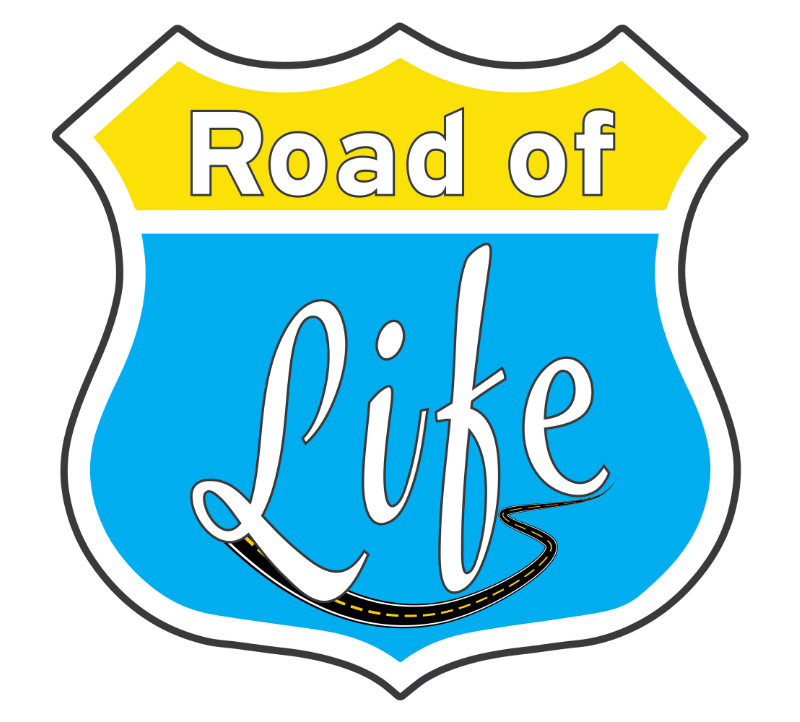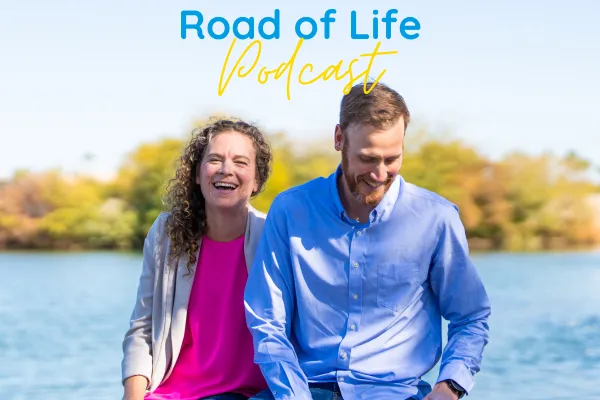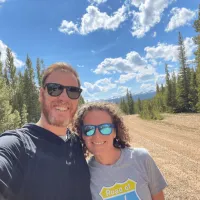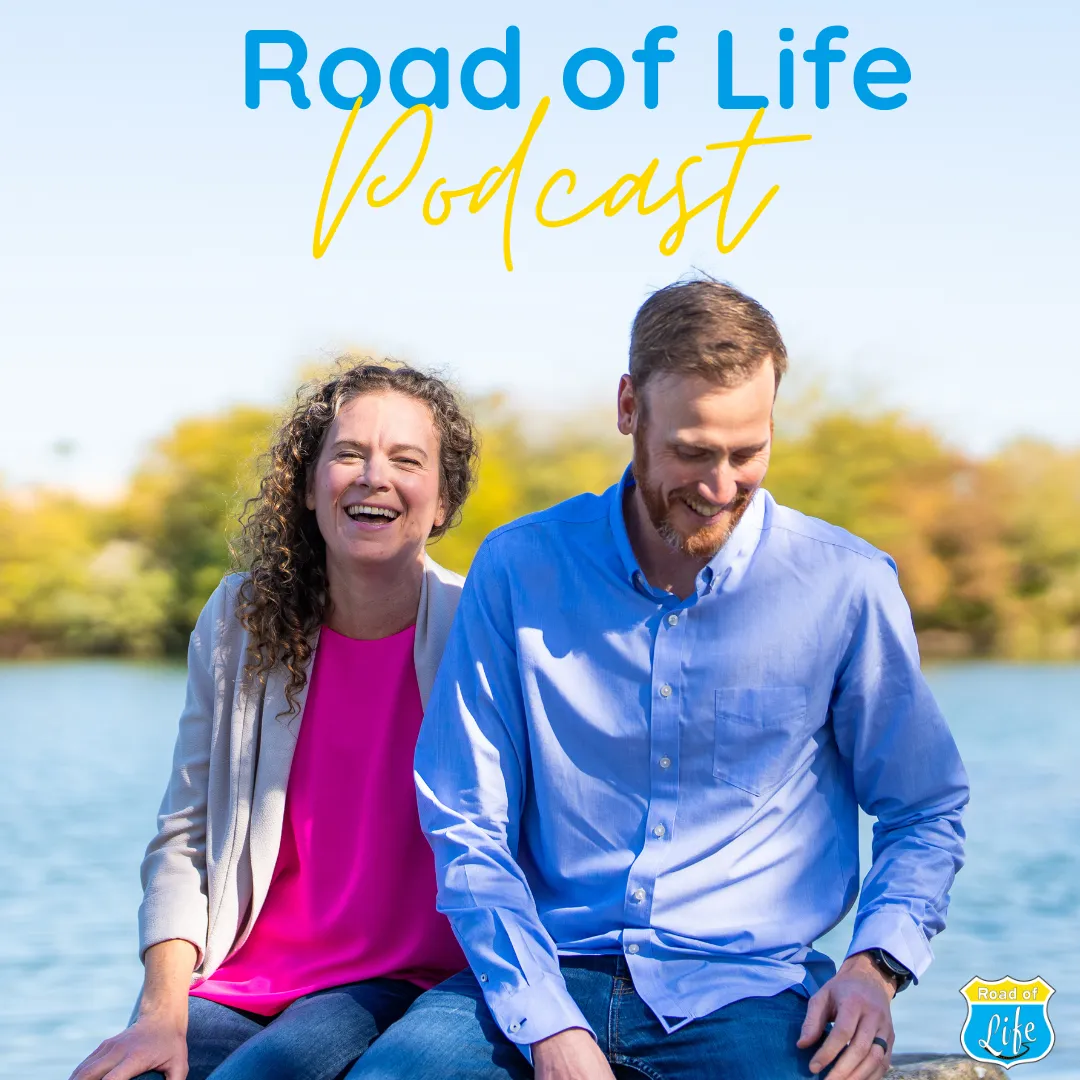
The
Road of Life
Podcast
With Meredith MacKay & Craig Bennett
Listen
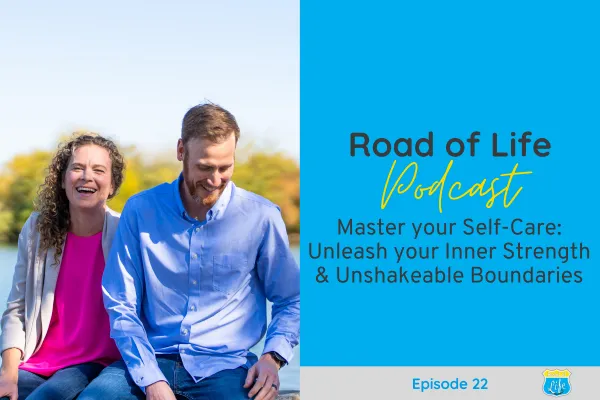
Road of Life Podcast Episode 22 - Master Your Self-Care: Unleash your Inner Strength & Unshakeable Boundaries
Self-Care: Unleash Your Inner Strength and Cultivate Unshakable Boundaries
Listen Now
Episode Transcription
Welcome back to the Road of Life podcast with Bennett and MacKay. We're back. This week we're going to talk about self care. This is near and dear to you. Yeah, it's been on my mind a lot lately. I've been thinking about it a lot, turning it over in my mind. And I started thinking about it actually because I'm going to speak about it in an event coming up in April in Calgary.
And so it's been getting me thinking a lot about what life is like today compared to what life was like three or four years ago.
Pretty same, pretty much the same,
right? Pretty much the opposite. Working in our corporate jobs, in our corporate life, our old life as I now lovingly refer to it. And it's so different than today.
Like, we've done a lot of work between then and now, and it's changed a lot of things. Most importantly, it's changed my mindset and how I see things. In my old life, when I was working in my corporate job, self care then was, your tank is empty, what are a couple things you can do to get your tank back up, you know, quarter tank, half tank, like put a little bit back in the tank so you can keep going.
And so, it was...
yeah, because you were, you were getting just drained every week, every week living for the weekends, can't wait for the weekends, but that's not enough to get you up to full again. Yeah, and so you're constantly, drawing down more replenishing a little but over time it never gets back to full Yeah, you're like, you know you maybe take a vacation and maybe maybe it gets close and then you go back and within a week you're it's drained again.
It's a good point, too, because the vacations were mostly, you know, we tried to do fun things on vacations, obviously, but a lot of that time was not out exploring and enjoying. It was recovering. Like, there was not a lot of rejuvenating. There was a lot of, like, just recovering from empty tanks on vacations.
Or if you took your vacation, you went to visit family or travel and you had a very specific agenda that, you know, you want to go and hit. Hit all the things, see all the people, do all the things, and that was exhausting in its own way, right?
Yeah, it's lovely, but also, does it always fill the tank all the way up?
And so, the self care then looked a lot like going for a massage, maybe a spa day once or twice a year, maybe getting your nails done, certainly a glass of wine, coming close to the weekends, end of a long day. Certainly sleeping in pretty hard on the weekends and almost shutting off and disconnecting on the weekends.
As much as possible escaping. And what I've come to realize is some of the activities that I classified then as self care actually walk a pretty fine line between self care and coping or self care and numbing. And so some of those things that, you know, I felt like I'd earned with a tough day or a tough week, like a glass of wine or, you know, the pizza or the, whatever it was that certainly the shutting off on the weekend and the, you know, sleeping as long as I could.
That was more of a way to escape than it was to fill myself back up and re-energize myself.
Because that glass of wine, when you drank it, it didn't make it like in the moment would feel good, but the next day it didn't, it didn't recharge you. It didn't refill your tank.
No, if anything it, you know, disrupted my sleep and, you know, in the end it actually had the opposite effect.
In the moment drinking it, it didn't, it felt great, but, you know, the impact on my body hours later was actually the opposite of what I was trying to do because it certainly did impact my sleep and my digestion and things like that. And so I've been given that a lot of thought. And so to me, the things I was doing then were really, at best, reactive self care, which to me, now that I've thought about it, reactive self care are the things you do after you've already been rung out.
Oh yeah. After you know, you're, you're hovering above empty. You need something to be able to keep going. That's the reactive self care. And the more I thought about why I let myself get that way was because I was a massive people pleaser. And. It's a work in progress. I'm, I'm not awesome at it now, but I'm way better than I was, and I, I was the person that, you know, when your boss or someone came to you with, do you have capacity to take this on?
Yes, ma'am. Of course I do. I always have capacity, and I did have a high capacity for work, for sure, but I also needed the external validation of a job well done. I needed someone to pat me on the back and give me a gold star and tell me I was good enough because I didn't actually believe I was good enough.
And so I needed someone else to tell me that. So that's the people pleasing, where my people pleasing comes from. Getting validation. Yeah, exactly. The external validation from other people. So I would seek out people pleasing behavior so that I could get my pat on the back. But that led me to not taking care of myself and burning out, because the only thing I knew about were these sort of reactive self care actions for after I was, you know, wrung out and bled dry.
And so I've started thinking more about proactive self care and the difference between the two. And obviously reactive and proactive, we all have sort of an intuitive understanding. But for me, I think reactive is the tank is empty. I got to put a little bit back in so I can keep going. Where proactive is let's increase the size of the tank so you always have what you need available.
And so the proactive self care comes into actually like proactively taking care of myself, of my body, physically, and of my mind, mentally. And so we've made some massive changes in our daily routines and our habits, but also our focus on our health. It's become a significantly higher priority now than it was before, and we like, we always were aware of it, but it wasn't the same level of priority as it is now.
I feel like in the last couple of years, it's become our identity. Yeah. We've inherited an identity that we are healthy people and we do healthy things. And so it's changed a lot of our habits and rituals around self care and what so instead of a glass of wine, we'll go for a workout or a run.
Yeah, or whatever. Yeah, for sure. And so things like the physical, of course, like prioritizing sleep and having your sleep routine and making sure you're getting enough sleep and tracking your sleep and all the stuff because I think fundamentally it all starts with sleep and hydration, water.
We were not drinking anywhere close to, we were perpetually dehydrated.
Okay. I would sit at my desk and I would have a bottle like a 750 ml. Yeah. Yeah bottle that I would fill maybe once a week.
So - I'm laughing because I know it's true.
I was like a raisin. Yeah Like I couldn't have been more dehydrated and still been alive. Yeah, I know. It's crazy Like this might be too much information for people. My urine was like yellow borderline orange, it was wild, so unhealthy so brutal. But honestly it was like, well I've got work to do and I'm just, I'm focused on, I'm doing stuff and the water's sitting right there.
I could easily take a sip, but then I'd have to deal like go constant going bath back and forth to the bathroom and it's got time for all that I got stuff to do.
What's your priority? Yeah, it's wild. Yeah. Your priority was the spreadsheet on the screen in front of you.
Yeah, and now I drink now don't look at my water bottle right now 'cause it's not doing very well. But I drink about four liters a day, close to, yeah, every day. And it's drastically different.
Well, even just your brain function, like from a, from a being hydrated perspective. And so for me, the, the two fundamentals of your physical health are sleep.
And hydration and the rest builds on there. And if you've got enough sleep, good quality sleep and you're hydrated, then you've got the energy to do everything else like your healthy eating and your exercise, your movement. And so we've prioritized all of that and made some drastic changes to our diet.
And we've certainly prioritized movement in our day. And so I feel better from that, like noticeable difference in how I'm feeling today than I was feeling physically in my body three years ago.
Yeah. What I like about it, what you said was that, you know, reactive, you're trying like heck to get back to full on your tank.
Whereas the proactive, you're actually just getting a bigger tank. Like you're, you're working out, which gives you more energy. You're drinking water, you're getting sleep, which gives you more capacity to do things during the day.
You're eating things that make you feel good Yeah, don't take away from you disrupt your sleep disrupt your digestion make you feel bloated make you feel bad Yeah, and so all of those things energize you, give you more vitality in your life.
It just gives you like you say a bigger tank to do more things.
Yeah, and then on the sort of mental side is two things that I've never had never done before Ever, ever. I tried to keep a journal five minutes 20 years ago, it didn't work. But journaling and meditating.
Yeah, and you're not alone there because like I historically, that's not something that I ever was brought up around or considered doing or like a Like a journal, honestly, a journal to me was like a diary and I thought that like, Dear Diary, that was kind of like a little, growing up, I would have thought that's a little, little girls keep little diaries or whatever.
That was, that was how I grew up thinking about it. And meditation, that's a little woo woo. That's, that's for the yogis. That's for the, the granola crunchers and tree huggers. And like, that's not.
And, and it was intimidating. Like, I don't know how to meditate. Like, I'm not that kind of a like, I didn't associate that with my identity at all, and I was intimidated by it because I didn't know how to do it and I wasn't looking for it. Yeah. But we introduced that and we started with some guided meditations, learned how to meditate on our own And we do it every day now.
And it's actually really going from someone who was what I just described to every day meditating and journaling... honestly, life changing.
Like, I've learned so much more about myself, like, just going in, inside myself, thinking about some things, writing out my thoughts.
Well, because I have the most, the most creative thoughts I have, or like, things come to me when I'm meditating that would never come to me any other time of day, because I have, like, it's like I've created space for, for those more creative or abstract thoughts that I, you know, when you're busy doing your spreadsheet, when you're busy doing your work, like head down doing stuff, that stuff doesn't often pop in.
And so the meditating for me has created a lot of space in my brain. And then the journaling, I agree, it's not a dear diary at all. It's a very structured approach. I journal the same things every day, what I'm grateful for, what my goals are, the identities I want to hold and the traits I want to put out, like, who I am, my identity, and I, I journal that every day, and that's how I'm becoming someone that prioritizes their health, that meditates, and, and all the things that I want to be and want to become, I'm becoming through the journaling. Mm hmm. And so, I think All of that has been really good for me physically and mentally, but what you said a minute ago around learning more about yourself, I think is, the critical piece for self care, because the ultimate in proactive self care is boundaries.
And as a recovering people pleaser, boundaries were something I was not good at. If you asked me for something, I said yes. Like, period. It's definitely something you're still working on. Oh, I said recovering. It's a work in progress. Yeah, I just want to For sure.
For like, it's, it's a, it's not like a switch that you can just on and off.
Like it, it's a lot of work because it was something that you were so used to. It was so, it was so part of your identity ingrained in you that it's...
I'm a high performer. I deliver for people. It takes a lot, a lot of work to turn that around. And so it does take a lot of work to turn that around. And I think there's two critical elements to being able to define and hold your boundaries.
I hadn't heard of it like this until a few weeks ago, a book I was reading, I can't think of the name right now, by the millennial therapist. I'll I'll think about it and I'll say it later, but she talks about your boundaries are the edges of you, which makes sense. Like what's a boundary?
The boundary of a property is the edge of the property. And so the boundaries of you are the edges of you. It's the silhouette of who you know yourself to be. If you don't know who you are, how do you know where your boundary is? How do you know what you will and will not accept? How do you know what you will and will not tolerate?
If you don't know who you are, you don't know your values, you don't know your purpose, you don't know yourself, how could you possibly know what your boundaries are? And so I didn't know myself. I didn't. And so I did not know where my boundaries were. So even if I wanted to hold a boundary, I didn't even know where it was.
I didn't know who I was. So the meditation and the journaling are critical pieces to knowing yourself so that you can at least define your boundaries. Like that's step one. What are my boundaries? I need to know where they exist before I can do anything with them. So the journaling, the meditating, you need to be able to identify where your boundaries are.
And then the next step is being able to enforce your boundaries, to hold your boundary. And I think you can only hold a boundary if you believe you're worthy of holding a boundary. You have to believe you're good enough as you are to be able to say no to somebody else. I couldn't do that before because I needed you, you being the general whoever, my boss, my whoever, my mom, my dad, my friend.
Someone outside of you. Someone outside of me to pat me on the back, give me a gold star and tell me I'm good enough. Because I didn't believe I was good enough. But once I believe I'm good enough, I don't need you to do that for me anymore. And in fact, anyone doing it for me was never enough. Like, there was never any one person who could say, good for you, you're good enough, and I would feel good enough.
Yeah. Right?
Because truly deep down inside, you didn't believe it.
Right. So only I could tell me I was good enough and I would actually believe it. And so until you believe you're worthy, you're never going to be able to hold your boundaries consistently. And so that also required a lot of work because I didn't obviously, with all the external validation and people pleasing, didn't believe I was good enough.
And so there was a lot of work over the last couple of years to work on my self worth. And it's, it's totally, it's evolved. Like there was. You know, at the very beginning when we started doing this, and I remember, I remember at the very beginning, like, oh, this is so cheesy, like, I know, I already know this, but there's a big difference between knowing something and feeling something, and in order to feel it, you have to actually experience it, and so the writing, 'I am enough' on the mirror, I still have the alarm on my phone going off every day that you are enough, 'I am enough'. And the high five, the Mel Robbins high five habit, look yourself in the eyeballs, smile at yourself, and give yourself a high five in the mirror.
And so started doing that every day. We don't have 'I Am Enough' written in the mirror anymore. And I remember when we first wrote it. I'm thinking like, I wonder if like people are gonna think when they're over in the bathroom and see it on the mirror, like part part of the issue. It was a hundred percent.
That we're trying to deal with.
Totally, but I was like, well, you know what? No one ever said anything about it, but you know, people who saw it I'm sure... Got the benefit of it. Got the benefit. Maybe it, maybe it motivated someone to put it on their mirror. Who knows? But it's not written on the mirror in this place we're living now.
Every single time I am in the bathroom, look myself in the mirror, I always look myself in the eye, smile at me, tell myself, I love you, I'm proud of you, you can do it, like, and then give myself a high five and keep going. So, I mean, we talked about how much Water, we drink. I'm in the bathroom a lot.
Yeah. And every single time, that's what I do. And so I've done a lot of work on that self-worth so that I can now not only identify my boundaries, but also hold my boundaries. You're doing a great job, . Thanks. 'cause I think the downstream effects of all that people pleasing. Well, I experienced it when we left our corporate jobs, right?
Like that was my primary source of external validation. And so when I left that job and I lost that external validation source. It was a bit of an identity loss, like January 2022, we talked about what a rough time that was, and it was on so many fronts.
You lose who you are.
Yeah. When you don't have the, the boundaries and you don't enforce them and you, you just, you don't realize who you are anymore. And so how could you ever be happy and fulfilled and living your best life if you don't even know who you are? Mm hmm.
Totally. And so I think the ultimate... I mean, I think all the proactive self care is important, but ultimately, I think it comes down to your boundaries, what you will and you will not accept in your life.
And that comes down to knowing yourself and believing you're worthy of your, of, of saying no to someone else so that you can say yes to yourself.
So I think the message that we want people to take away today is to really understand who they are and know that they're enough. Exactly as they are.
Because I think we have an epidemic of unworthiness.
It's literally, I think, the biggest thing holding everyone back from living their best life is, I think most people in the world do not believe they're worthy to have the life that they really, really want. And therefore do not do the things required to get it.
Self sabotage, all those things that come up because they don't feel they're worthy.
They settle for less than they deserve because they don't believe they deserve more.
And I believe that's why people don't go after their dream career or business or whatever they stay in relationships that aren't healthy for them
They don't prioritize their physical health because they're not worth it.
Exactly. All the things right like all the the things that that people struggle with, most of it is because they actually don't feel like they're worthy to have anything else.
And I wouldn't have said that three... even though that's exactly where I was, I wouldn't have necessarily identified that on the surface three or four years ago.
No, it took a little prompting for like what deep down is holding you back, what is holding, like it was a, what is holding you back, what is holding you back, like really getting pushed and it was like, I'm not enough. I'm not good enough. And I was like, holy shit. Where did that come from?
And it's perpetuated in like social media.
We, there's this comparison, you see what everyone else is like the, the best of the best, what people want you to see. And, you know, you compare that and it's like, Oh my God, they're doing this, and I'm nowhere near that. I'm not good enough. And it just, it's a cycle. It's a vicious cycle. So yeah, it's it's an epidemic.
And so I just got my worthy book worthy from Jamie Kern Lima I can't wait to start it. I've finished my last book today. So picking that one up tomorrow.
Nice So yeah I think it's really the message you want people to take away from today is to understand that they need to understand who they are.
We need to understand, as people, we need to understand who we are and believe that we're worthy of the things we want in life and once you believe that taking action towards those things becomes easier.
Yeah. So, in terms of a couple of homework items to take away, this isn't just listening, there's actually some doing involved. When you at least once a day if not every single time you wash your hands: Look yourself in the eye in your bathroom mirror, smile at yourself, which can be hard, but look yourself in the eye and smile at yourself and then give yourself a high five.
Even the corporate version of me, who was drinking a sip of water a day, would go to the bathroom at least once.
So you could look yourself in the mirror at least one time and say, you're badass, you're worthy, go get it. And high five yourself or fist bump yourself or whatever you're, kiss yourself if you want. Whatever, whatever's your go to move. So even that version of me could do it. So anybody can do it.
Totally. And then the other thing, because I found meditating so intimidating, is it doesn't have to be long, like five minutes. You can start with five minutes either of just breathing in and out and literally thinking breathe in, breathe out. Like that's it. Or there's a bazillion apps now.
Go on to Calm or Headspace or get a five, ten minute guided meditation.
I started meditating. I had no idea what to do. Like I'm just sitting... so what do I do? Just sit here? Yeah. And just what, what do I do? Try not to think. What does that mean? Exactly. But the guided meditations were, were a game changer.
Just get the muscle going. Yeah. Yeah.
So the mirror high five and the guided meditation, those guided meditation, five, 10 minutes, the mirror high five, three seconds. It doesn't take a lot of time, but it makes a huge difference. So what's, what's the worst that can happen? What's the best that can happen?
You might as well give it a go.
Might as well give it a go. I think that's it. That's it MacKay.
Bye.

Meet
Meredith & Craig
Life partners, business partners, and best friends. We left the corporate grind to become fulltime entrepreneurs... with no idea what we were doing.
That made for some interesting, amazing, stressful, awesome, painful, scary, awful, awesome, insightful, unbelievable decisions, moments, experiences, relationships, and quite honestly, we wouldn’t have it any other way.
Our marriage is the foundation for everything else we build in our lives. It is a cheat code for life, and we believe that having that part dialed in levels up every other part of life.
We help others live their dream life... and that starts with a rock solid relationship so they can level up the rest of their lives too.
Tune in for a dose of laughter, love, a gentle ass kicking, and game-changing wisdom that will help you unleash your potential and build the life of your dreams together.
